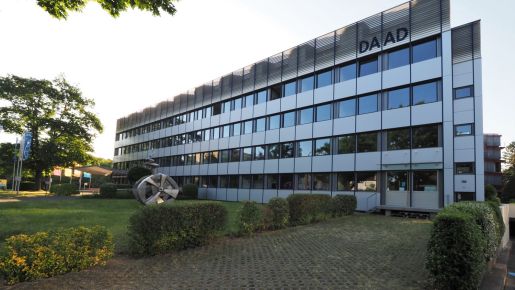The DAAD is facing substantial cuts
Budget reductions
The German Academic Exchange Service (DAAD) is highly likely to be facing extensive budget cuts. Its scholarships and mobility funding in projects at German higher education institutions must therefore be significantly reduced at short notice: around 6,000 scholarships alone could be cancelled.

“The cuts to our core funding from the Federal Foreign Office decided by the Federal Cabinet represent a substantial reduction in the DAAD’s financial resources and thus in its global activities. They will significantly limit our funding opportunities in terms of higher education institutions, students and researchers for years to come”, said DAAD President Professor Joybrato Mukherjee in Bonn. “These cuts will also have a negative impact on the international attractiveness of Germany and its higher education institutions as a research location, especially at a time when international academic policy suggests it is particularly important for Germany to be a role model and to provide leadership.”
The DAAD’s institutional funding from the German Federal Foreign Office – in the case of universities this could be considered as core funding – is to be reduced from 204 million euros in 2021 (including investments) to around 195 million euros this year. The cabinet decision foresees a further cut to 191 million euros in 2023. The DAAD will therefore be losing around 13 million euros of core funding in two years’ time. There is also some discussion regarding further short-term funding blocks, so-called ‘global underspend’, which would lead to revenue declines in the current 2022 budget year.
Impacts of the cuts
This substantial reduction in its core funding is already forcing the DAAD to make painful cuts in its central activities. Further restrictions in its programmes could result from the additional cuts currently under consideration.
The DAAD is therefore now informing all German universities about unavoidable cuts, especially in the following areas: the award of long-term study and doctoral scholarships for foreign students, doctoral candidates and researchers has to be reduced by 50 per cent, which means the loss of around 700 long-term scholarships per year. The funding of lecture and congress trips, summer and winter courses as well as the cancellation of all other short-term funding, which affects around 5,000 people per year. Lectureships at international universities cannot be refilled, so around 100 of the almost 450 locations worldwide where German researchers represent the German higher education system will disappear in the medium term. The six Deutsche Wissenschafts- und Innovationshäuser (DWIH) will lose considerable financial leeway. Funds for the care of international students at German higher education institutions are to be halved. Regionally aligned cooperation programmes at German universities will also see drastic reductions, as will the funding of German Studies and the DAAD’s alumni activities.
“We view these threatened cuts with great regret and with grave concern. They counteract the conceptually correct stipulations and financial commitments in the federal government’s coalition agreement”, says Joybrato Mukherjee. “We trust that these reductions will be withdrawn in the further parliamentary process of budget preparation, and hope and expect this too for our fellow partner organisations, the Alexander-von-Humboldt-Foundation and the Goethe-Institut, which are also affected by cutback scenarios.”